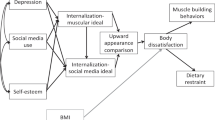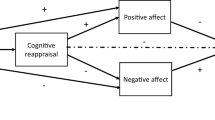Abstract
Objectives
The present study aimed at developing an Arabic version of the Emotional Eating Scale (EES) and examining its reliability and validity among a sample of the Lebanese population. The secondary objective was to evaluate the correlation between emotional eating and body dissatisfaction along with depression and/or self-esteem among a representative sample of the Lebanese population.
Methods
This cross-sectional study was conducted between January and May 2018. The sample was drawn proportionately from all Lebanese Mohafazat.
Results
All items could be extracted from the list, except items 17 and 19. The EES items converged over a solution of four factors that had an Eigenvalue over 1, explaining a total of 67.06% of the variance (KMO = 0.939; Bartlett’s test of sphericity p < 0.001; αCronbach = 0.952). A higher body dissatisfaction was significantly associated with higher emotional eating (β = 0.31) and lower self-esteem (β = − 0.054); however, no significant association was found with depression. Self-esteem and depression were not found to be significantly associated with emotional eating. When introducing depression and self-esteem as mediator factors for body dissatisfaction and emotional eating, body dissatisfaction did not remain significantly associated with emotional eating.
Conclusion
In this study, the Emotional Eating Scale was validated in Arabic among the Lebanese adult population, making this scale usable in further Lebanese research. Moreover, our results showed that body dissatisfaction was positively correlated with emotional eating and self-esteem, but not with depression. A positive association between body dissatisfaction and emotional eating was also demonstrated. This research offers new perspectives for the evaluation of emotional eating among the Lebanese adult population.
Level of evidence
Level V Cross-sectional descriptive study.


Similar content being viewed by others
References
Frayn M, Knäuper B (2018) Emotional eating and weight in adults: a review. Curr Psychol 37:924–933
Denke G, Rawls E, Lamm C (2018) Attentional conflict moderates the association between anxiety and emotional eating behavior: an ERP Study. Front Hum Neurosci 12:194
Höppener MM, Larsen JK, van Strien T, Ouwens MA, Winkens LH, Eisinga R (2019) Depressive symptoms and emotional eating: Mediated by mindfulness? Mindfulness 10:670–678
Frayn M, Khanyari S, Knauper B (2019) A 1-day acceptance and commitment therapy workshop leads to reductions in emotional eating in adults. Eat Weight Disord. https://doi.org/10.1007/s40519-019-00778-6
Altheimer G, Urry HL (2019) Do emotions cause eating? The role of previous experiences and social context in emotional eating. Curr Direct Psychol Sci. https://doi.org/10.1177/0963721419837685
Wyssen A, Bryjova J, Meyer AH, Munsch S (2016) A model of disturbed eating behavior in men: the role of body dissatisfaction, emotion dysregulation and cognitive distortions. Psychiatry Res 246:9–15
Johnson F, Wardle J (2005) Dietary restraint, body dissatisfaction, and psychological distress: a prospective analysis. J Abnorm Psychol 114:119
Brechan I, Kvalem IL (2015) Relationship between body dissatisfaction and disordered eating: mediating role of self-esteem and depression. Eat Behav 17:49–58
Konttinen H, Van Strien T, Männistö S, Jousilahti P, Haukkala A (2019) Depression, emotional eating and long-term weight changes: a population-based prospective study. Int J Behav Nutr Phys Act 16:28
Schafer JO, Naumann E, Holmes EA, Tuschen-Caffier B, Samson AC (2017) Emotion regulation strategies in depressive and anxiety symptoms in youth: a meta-analytic review. J Youth Adolesc 46:261–276
Saade S, Hallit S, Haddad C, Hallit R, Akel M, Honein K, Akiki M, Kheir N, Obeid S (2019) Factors associated with restrained eating and validation of the Arabic version of the restrained eating scale among an adult representative sample of the Lebanese population: a cross-sectional study. J Eat Disord 7:24. https://doi.org/10.1186/s40337-019-0254-2
Haddad C, Obeid S, Akel M, Honein K, Akiki M, Azar J, Hallit S (2019) Correlates of orthorexia nervosa among a representative sample of the Lebanese population. Eat Weight Disord 24:481–493
Zeidan RK, Haddad C, Hallit R, Akel M, Honein K, Akiki M, Kheir N, Hallit S, Obeid S (2019) Validation of the Arabic version of the binge eating scale and correlates of binge eating disorder among a sample of the Lebanese population. J Eat Disord 7:40
https://www.psychiatry.org/patients-families/eating-disorders/what-are-eating-disorders A.P.A.: What are eating disorders?
Esterling BA, L’Abate L, Murray EJ, Pennebaker JW (1999) Empirical foundations for writing in prevention and psychotherapy: mental and physical health outcomes. Clin Psychol Rev 19:79–96
Ricca V, Castellini G, Fioravanti G, Sauro CL, Rotella F, Ravaldi C, Lazzeretti L, Faravelli C (2012) Emotional eating in anorexia nervosa and bulimia nervosa. Compr Psychiatry 53:245–251
Duarte C, Pinto-Gouveia J (2015) Returning to emotional eating: the emotional eating scale psychometric properties and associations with body image flexibility and binge eating. Eat Weight Disord 20:497–504
Arnow B, Kenardy J, Agras WS (1995) The Emotional Eating Scale: The development of a measure to assess coping with negative affect by eating. Int J Eat Disord 18:79–90
Bektas M, Bektas I, Selekoğlu Y, Kudubes AA, Altan SS, Ayar D (2016) Psychometric properties of the Turkish version of the Emotional Eating Scale for children and adolescents. Eat Behav 22:217–221
Boutelle KN, Braden A, Knatz-Peck S, Anderson LK, Rhee KE (2018) An open trial targeting emotional eating among adolescents with overweight or obesity. Eat Disord 26:79–91
Haddad C, Hallit R, Akel M, Honein K, Akiki M, Kheir N, Obeid S, Hallit S (2020) Validation of the Arabic version of the ORTO-15 questionnaire in a sample of the Lebanese population. Eat Weight Disord 25:951–960. https://doi.org/10.1007/s40519-019-00710-y
Haddad C, Zakhour M, Akel M, Honein K, Akiki M, Hallit S, Obeid S (2019) Factors associated with body dissatisfaction among the Lebanese population. Eat Weight Disord 1–13
Sfeir E, Haddad C, Salameh P, Sacre H, Hallit R, Akel M, Honein K, Akiki M, Kheir N, Obeid S, Hallit S (2019) Binge eating, orthorexia nervosa, restrained eating, and quality of life: a population study in Lebanon. Eat Weight Disord. https://doi.org/10.1007/s40519-019-00831-4
Haddad C, Khoury C, Salameh P, Sacre H, Hallit R, Kheir N, Hallit S (2020) Validation of the Arabic version of the eating attitude test in lebanon: a population study. Public Health Nutr 1–12: https://doi.org/10.1017/S1368980020002955
Comrey AL, Lee HB (2013) A first course in factor analysis. Psychology press. New Jersey, USA
Weary-Smith KA (2007) Validation of the Physical Activity Index (PAI) as a measure of total activity load and total kilocalorie expenditure during submaximal treadmill walking. University of Pittsburgh, Pittsburgh
Rosenberg M (1965) Rosenberg self-esteem scale (RSE). Acceptance and commitment therapy. Measur Package 61:18
Hamilton M (1960) A rating scale for depression. J Neurol Neurosurg Psychiatry 23:56
Obeid S, Hallit CAE, Haddad C, Hany Z, Hallit S (2018) Validation of the Hamilton Depression Rating Scale (HDRS) and sociodemographic factors associated with Lebanese depressed patients. L'Encéphale 44:397–402
IBM Knowledge Center. KMO and Bartlett's Test. Available from: https://www.ibm.com/support/knowledgecenter/SSLVMB_23.0.0/spss/tutorials/fac_telco_kmo_01.html.
Tanofsky-Kraff M, Theim KR, Yanovski SZ, Bassett AM, Burns NP, Ranzenhofer LM, Glasofer DR, Yanovski JA (2007) Validation of the emotional eating scale adapted for use in children and adolescents (EES-C). Int J Eat Disord 40:232–240
Arnow B, Kenardy J, Agras WS (1995) The Emotional Eating Scale: the development of a measure to assess coping with negative affect by eating. Int J Eat Disord 18:79–90
Sanchez-Ruiz MJ, El-Jor C, Kharma JA, Bassil M, Zeeni N (2019) Personality, emotion-related variables, and media pressure predict eating disorders via disordered eating in Lebanese university students. Eat Weight Disord 24:313–322
Maslow AH (1981) Motivation and personality. Prabhat Prakashan
Choi E, Choi I (2016) The associations between body dissatisfaction, body figure, self-esteem, and depressed mood in adolescents in the United States and Korea: a moderated mediation analysis. J Adolescence 53:249–259
Funding
The authors did not obtain any funding for this project.
Author information
Authors and Affiliations
Corresponding authors
Ethics declarations
Conflict of interest
The authors have no conflicts of interest to disclose.
Ethical approval
The Psychiatric Hospital of the Cross Ethics and Research Committee, in compliance with the Hospital’s Regulatory Research Protocol, approved this study protocol (HPC-020-2018) based on multiple objectives involving the validation of many disordered eating scales and factors associated with them (restrained eating, binge eating, orthorexia nervosa, emotional eating and body dissatisfaction).
Informed consent
A written informed consent was obtained from each participant.
Additional information
Publisher's Note
Springer Nature remains neutral with regard to jurisdictional claims in published maps and institutional affiliations.
Rights and permissions
About this article
Cite this article
Rahme, C., Obeid, S., Sacre, H. et al. Emotional eating among Lebanese adults: scale validation, prevalence and correlates. Eat Weight Disord 26, 1069–1078 (2021). https://doi.org/10.1007/s40519-020-01001-7
Received:
Accepted:
Published:
Issue Date:
DOI: https://doi.org/10.1007/s40519-020-01001-7




